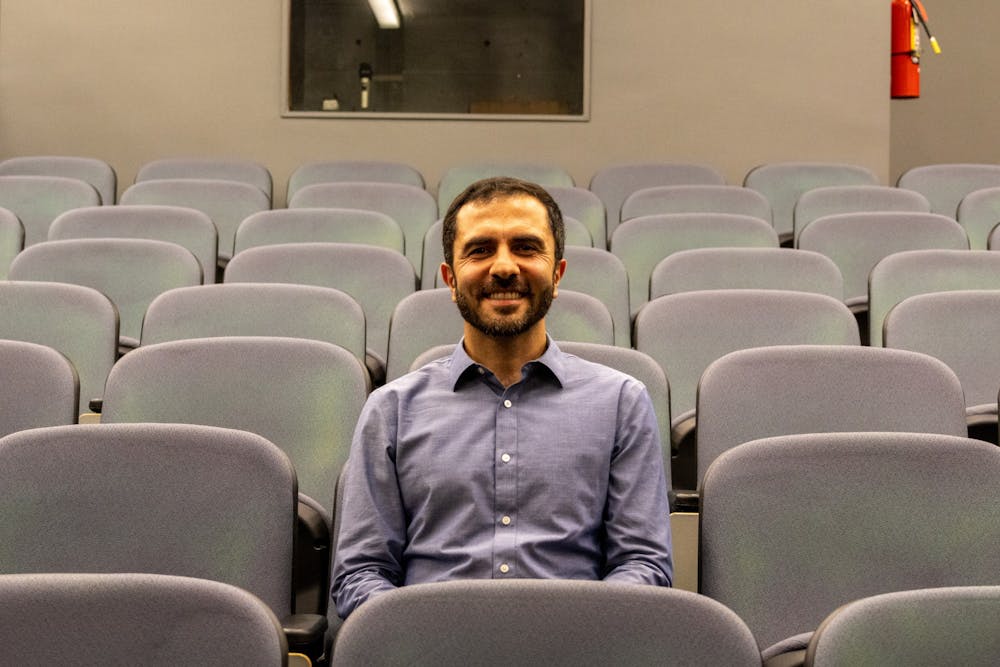It took a second to get everyone sitting. Not the audience, who had found their seats 15 minutes before the film began, but the Iranian family on screen struggling to take a family photo, with the full ordeal of a baby stealing a phone, a kid looking away, and someone sitting in the front row that should definitely have been in the back. The typically comedic chaos accompanying any family picture made sure to sneak its way into Penn’s annual Middle East Film Festival.
Originally the brain child of Hebrew professor Nili Gold and Assistant Director of Cinema and Media Studies Nicola M. Gentili, the Middle East Film Festival uniquely showcases independent Middle Eastern films as a bridge between cultures. This year marked the first in–person festival since the outbreak of the COVID–19 pandemic. In accordance with the theme of uplifting female directors, the festival played star films (directed by females, of course) from Palestine, Turkey, Israel, Iran, and Lebanon. Each one was presented by a member of the Middle East Center, followed by a Q&A session with the audience.

Professor Mahyar Entezari presented the Iranian documentary The Silhouettes by Afsaneh Salari. Entezari, a lecturer in the Near Eastern Languages and Civilization Department, balances coordinating the Persian Language Program with teaching a class on Iranian cinema. “I think there are many ways to study culture,” he says. “But cinema is very vivid and relatable for people.” In pursuing a young fascination with languages, he studied German in college and subsequently immersed himself in the country’s culture for a few years afterwards. Later, he found his true calling in his mother tongue and decided to educate others on Persian language and cultural studies. Teaching a class on Iranian cinema, Entezari relies on film as a tool of social and political examination.
The Silhouettes focuses on a family of Afghani immigrants in Iran facing legal and economic discrimination, rendering them unable to attend public school, aspire to jobs higher than manual labor, or travel freely. Their youngest son Taghi struggles with prospects of his future as an alien in his native country and ultimately grapples with the decision of returning to Afghanistan or staying with his family in Iran.
When asked about the English title of the film, Entezari shared his personal correspondence with the director. “When [she] was developing the project, the word ‘silhouettes’ resonated a lot with [her], because Afghans—and probably many second class citizens everywhere in the world—are somehow perceived as communities without particular stories, colors, or significance, like a silhouette without any detail,” he recalls. “With The Silhouettes, [she] tried to shed light on intimate family stories, seeing their feelings, uniqueness, and similarity to any other family in the world.” A family unit is a form of community almost everyone can relate to. As Entezari says, “It’s a story about trying to belong someplace.” No matter the person, everyone wants to feel like they fill their own little niche.

The theme extends beyond Afghani migrants struggling with their identities towards anyone looking to forge their own path in a new place—including most Penn students. “When you move away from home for the first time,” Entezari says, “it’s really up to you to create part of your identity.” To that end, he works to foster a welcoming environment to encourage self–discovery in a way that’s best for his students, beginning with the film festival itself.
Entezari believes that international cinema has the capacity to change people’s worldviews “just by seeing how ordinary people live.” The constant news stream of political events can reduce the Middle East to a crisis—causing us to forget about the very real people who live there. Film as a medium has the ability to bridge the gap between the personal and political. Entezari agrees, hoping that festival–goers realize that “Whether [people are] in Israel or Iran, more things connect rather than divide them, [regardless] of their government's politics.”
While the Middle East Film Festival offers a window for viewers to experience a new story, it also serves as a mirror for members of the Middle Eastern Diaspora to see themselves. “Every time I watch an Iranian film, beyond paying attention to its aesthetics or message or looking at it as a film scholar, I also appreciate it as someone as a member of the Iranian diaspora looking at my ancestral homeland through that lens and seeing someplace I can’t go to,” Entezari says.
He reflects on a similar moment back in high school, when he saw his favorite film The White Balloon by Jafar Panahi. “I remember seeing it in the ‘90s, when for the first time you could find an Iranian film at Blockbuster. It was like a slice of the old world you could see at home.”
And if you make your way to the next Middle East Film Festival, there’s no doubt you’ll feel the same way. Just ask Entezari.







